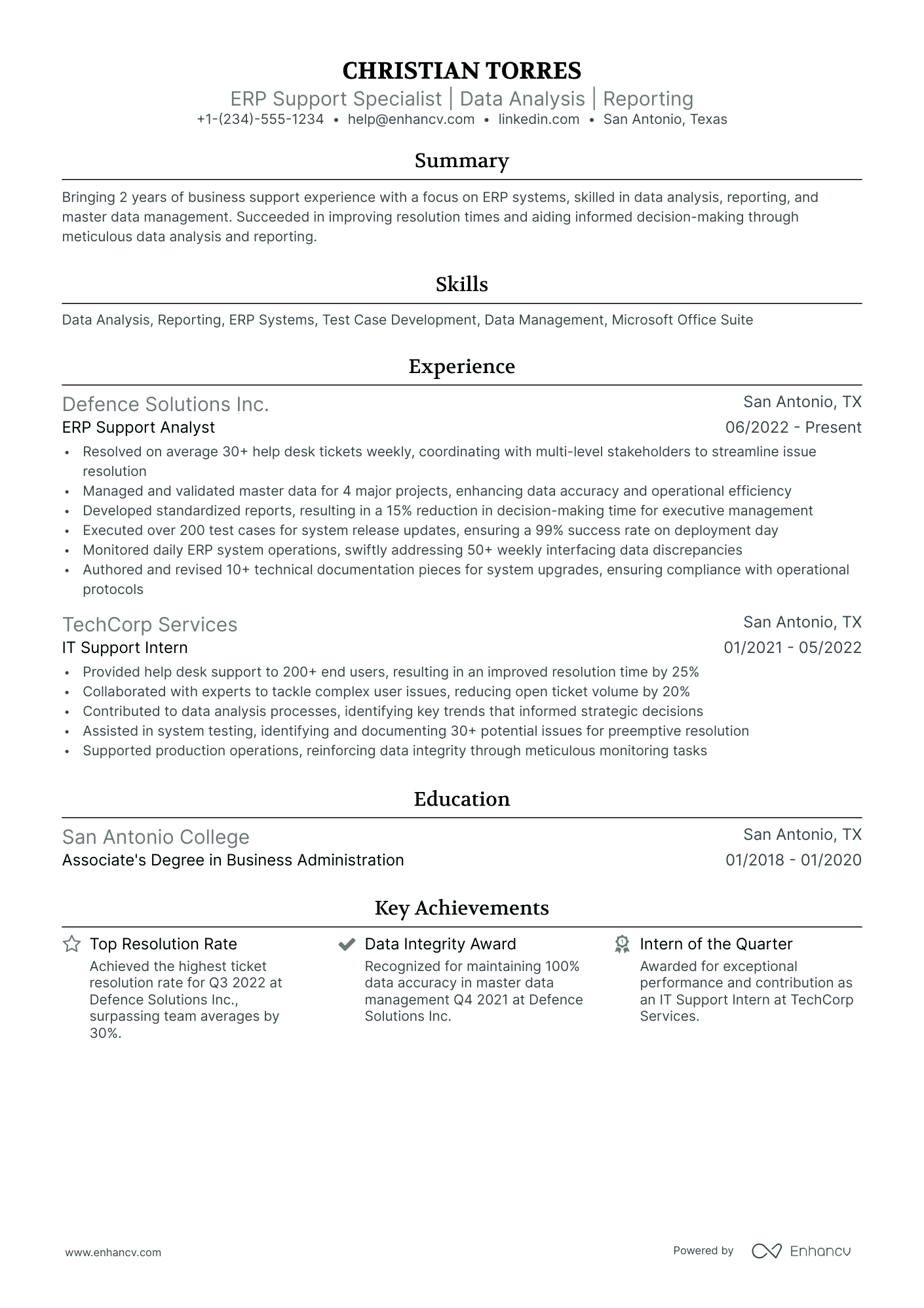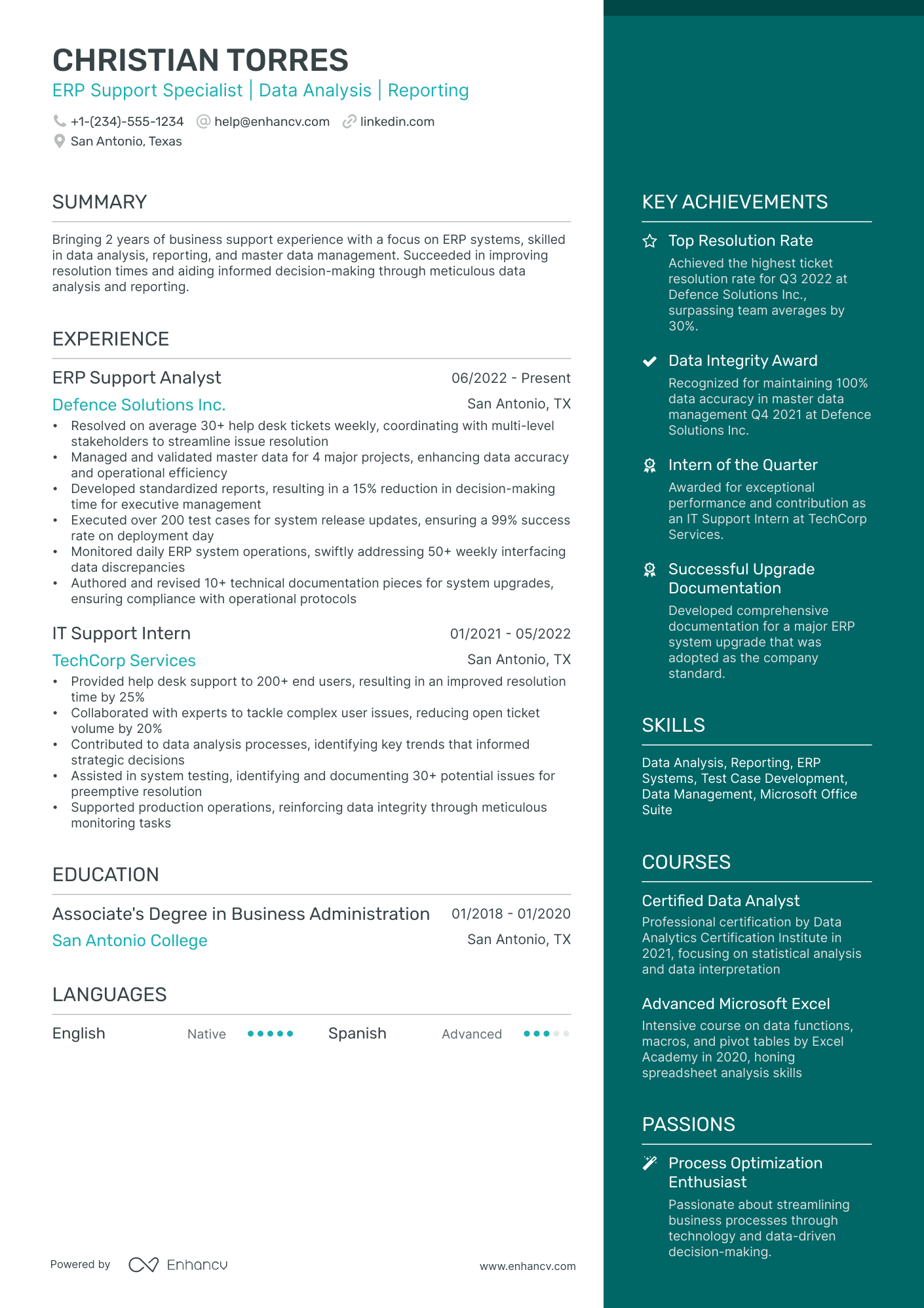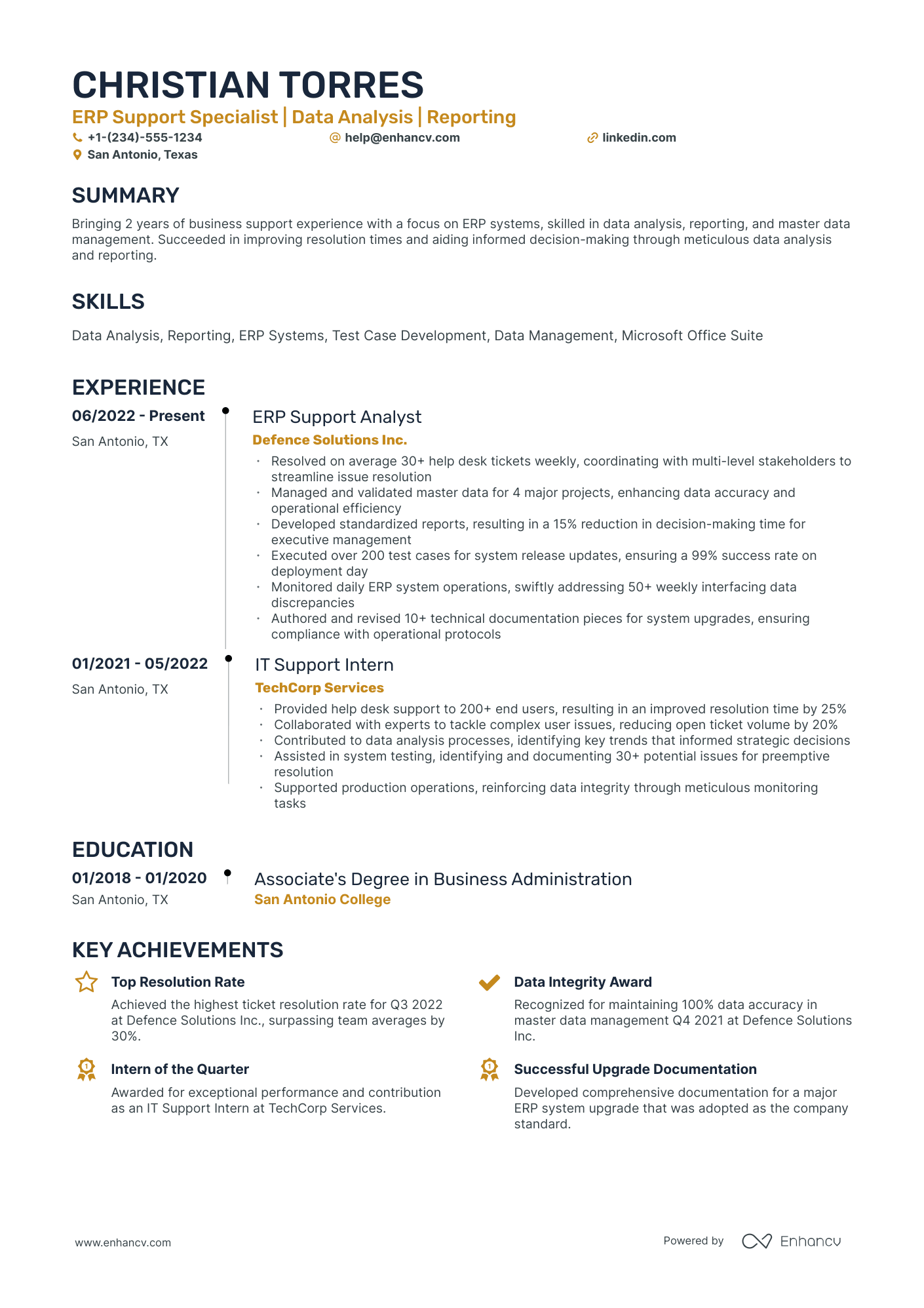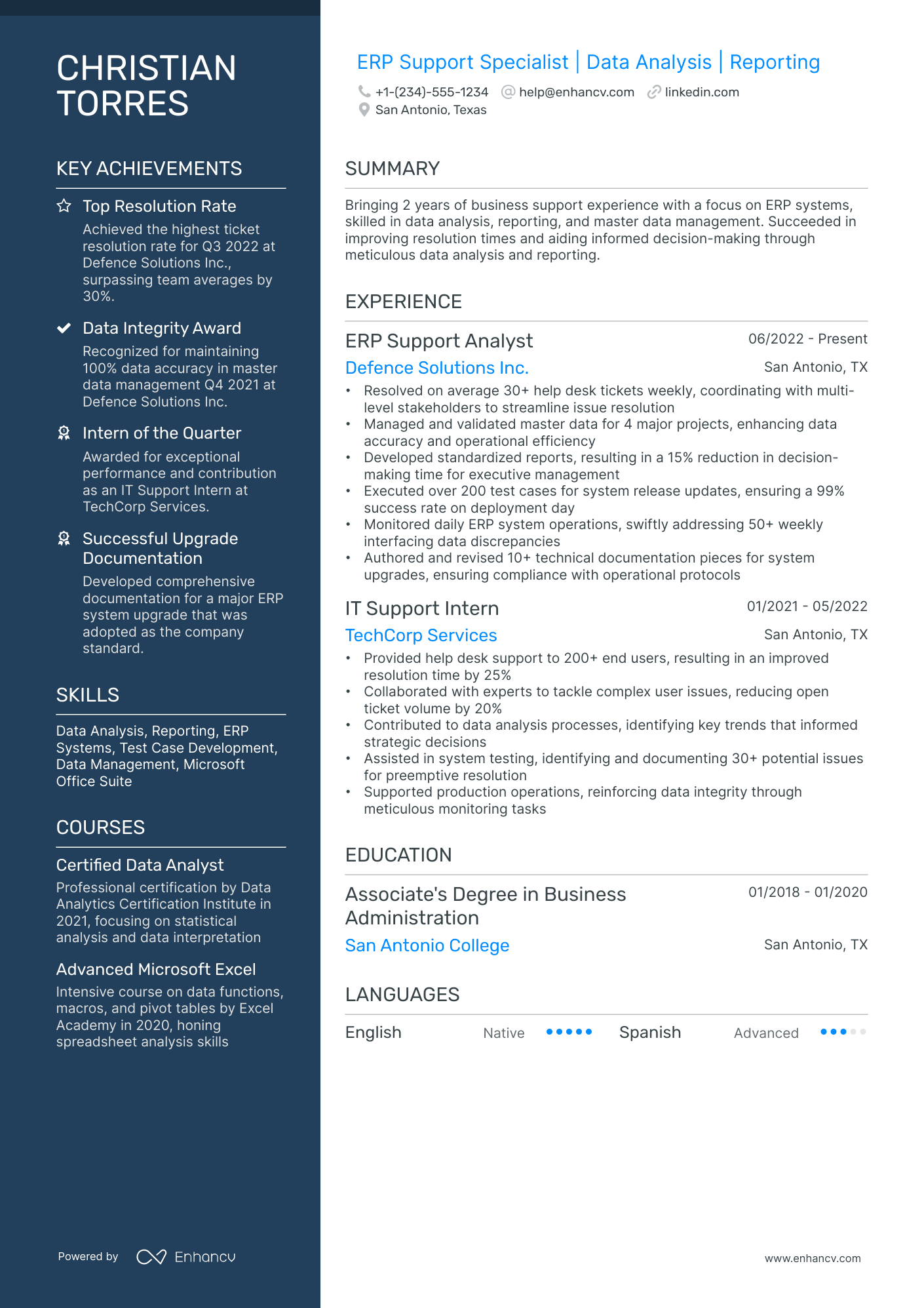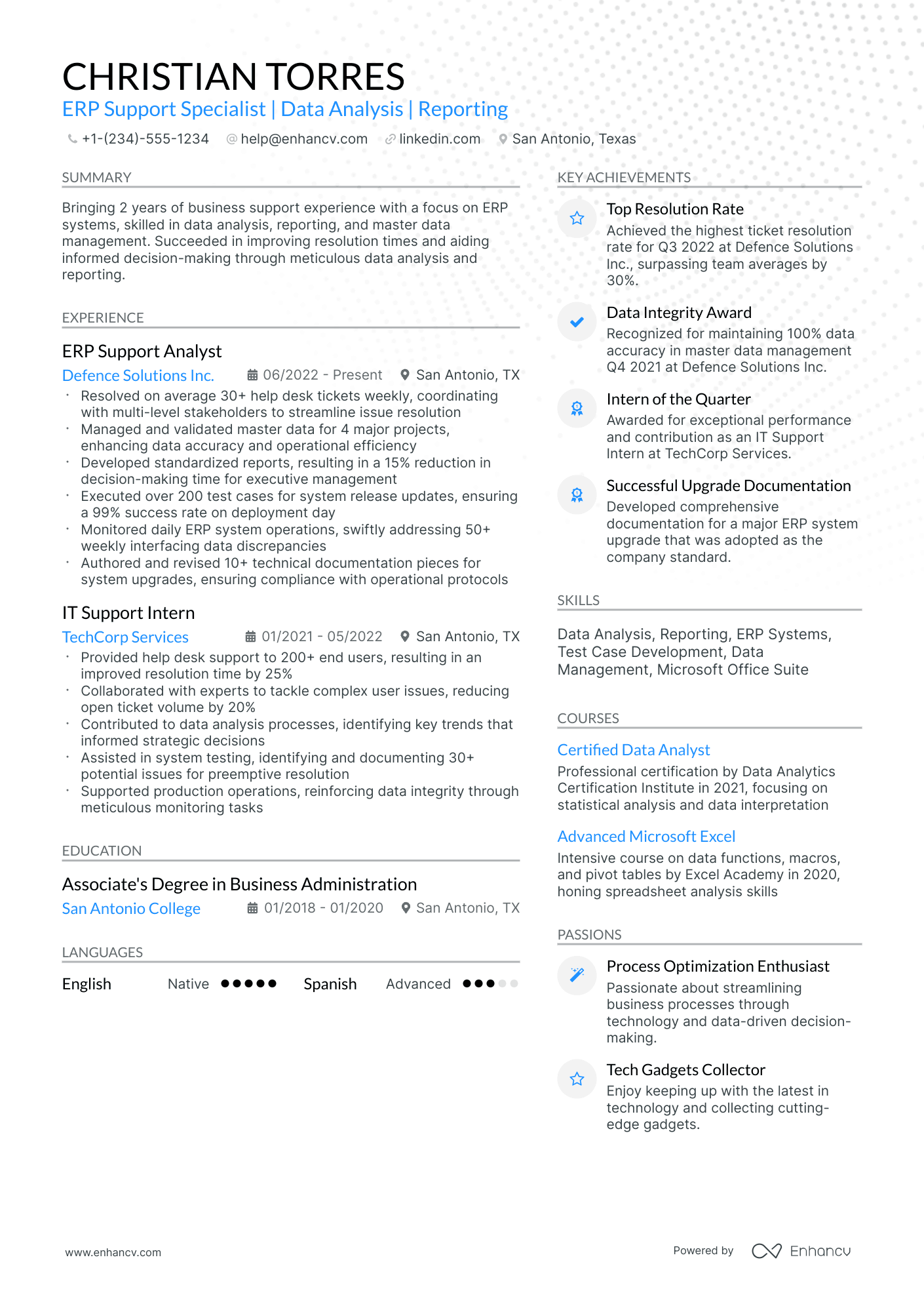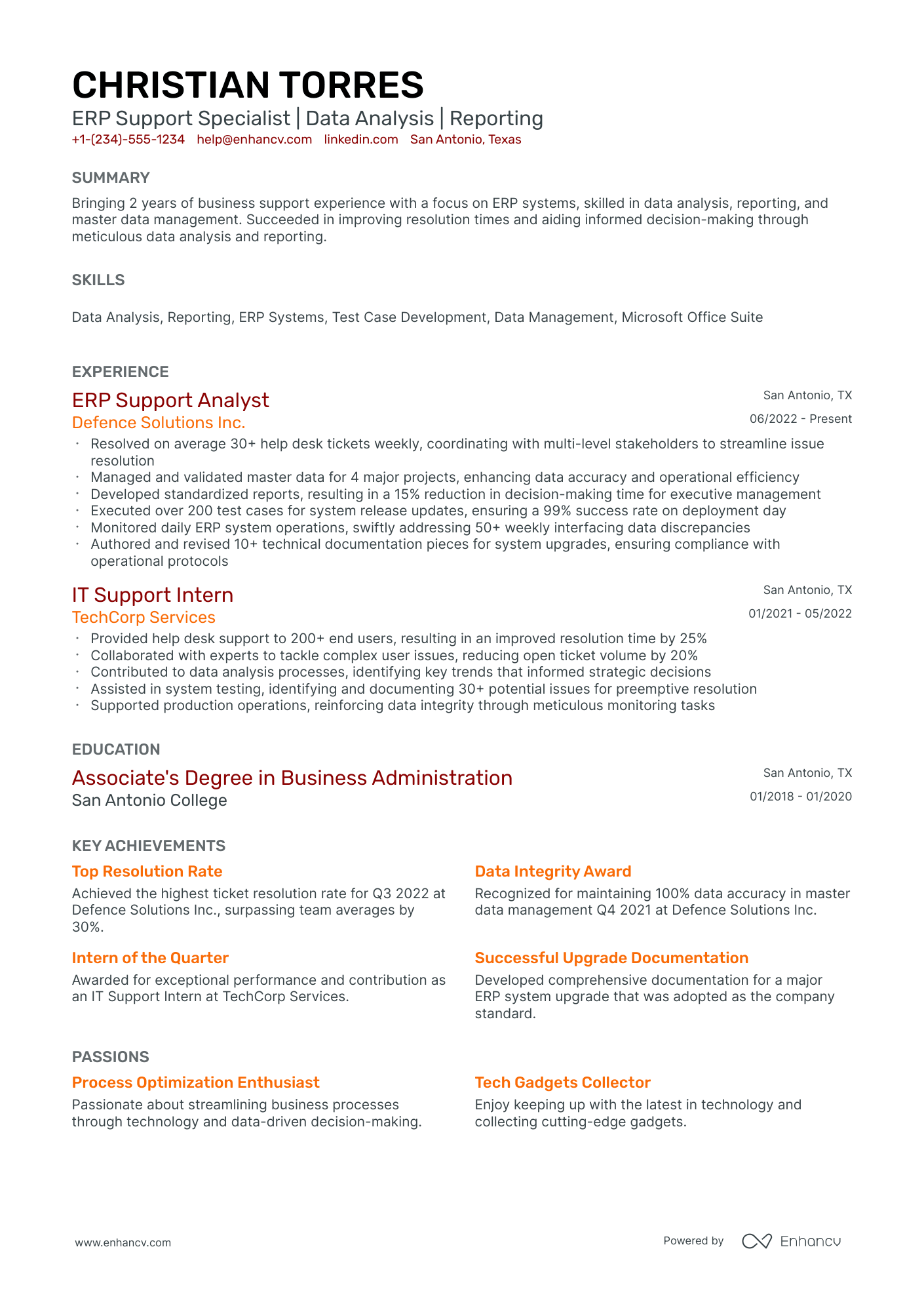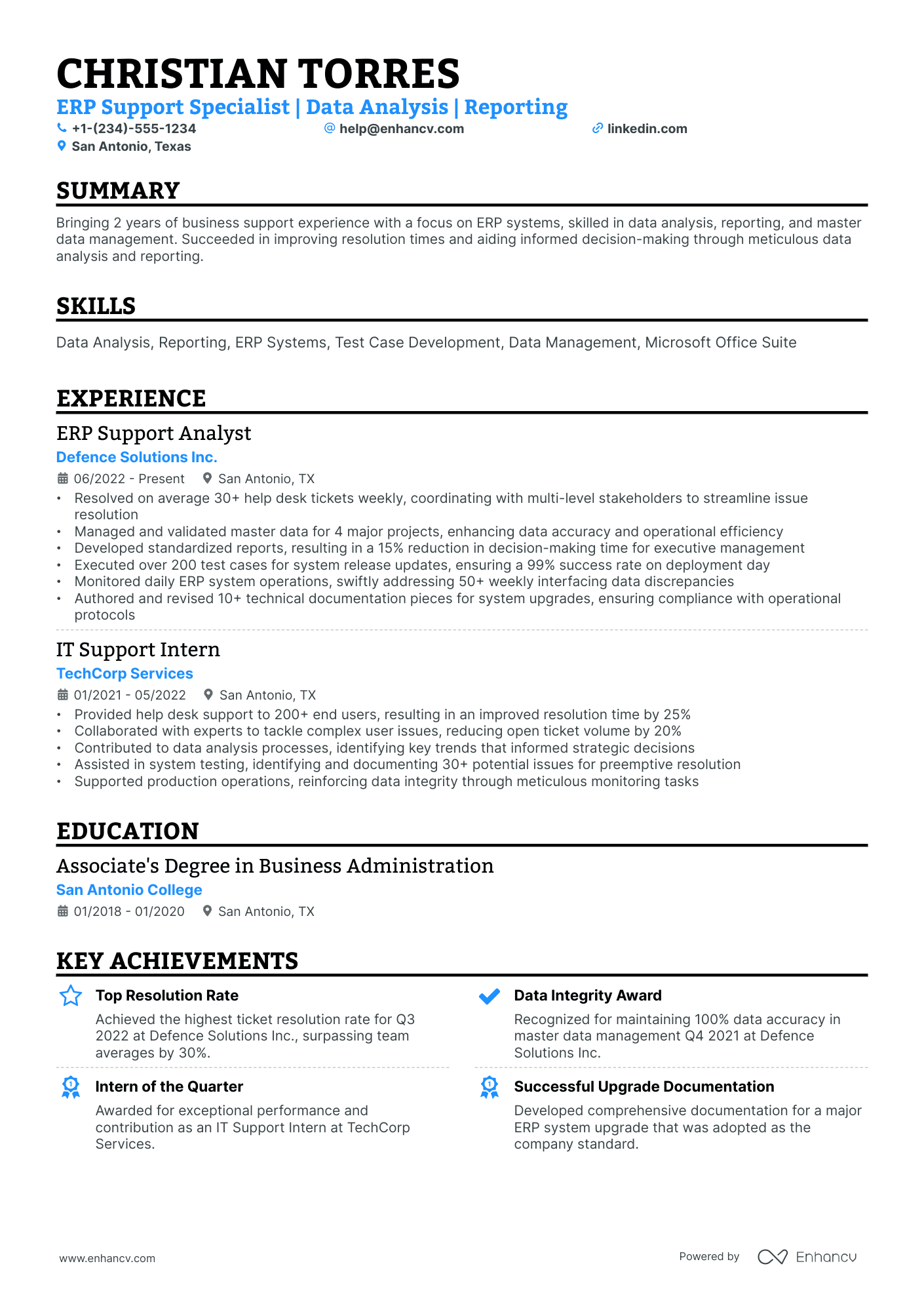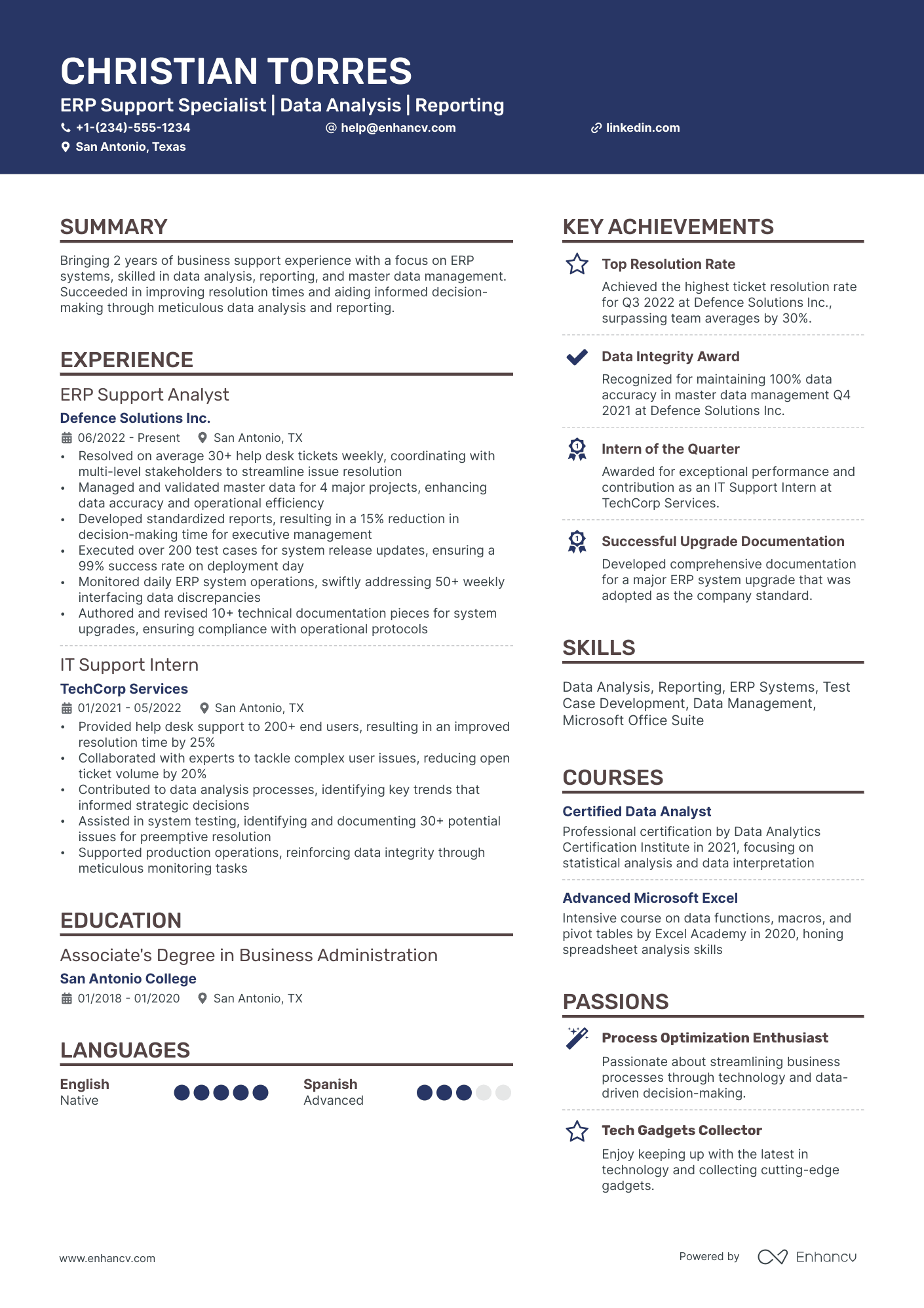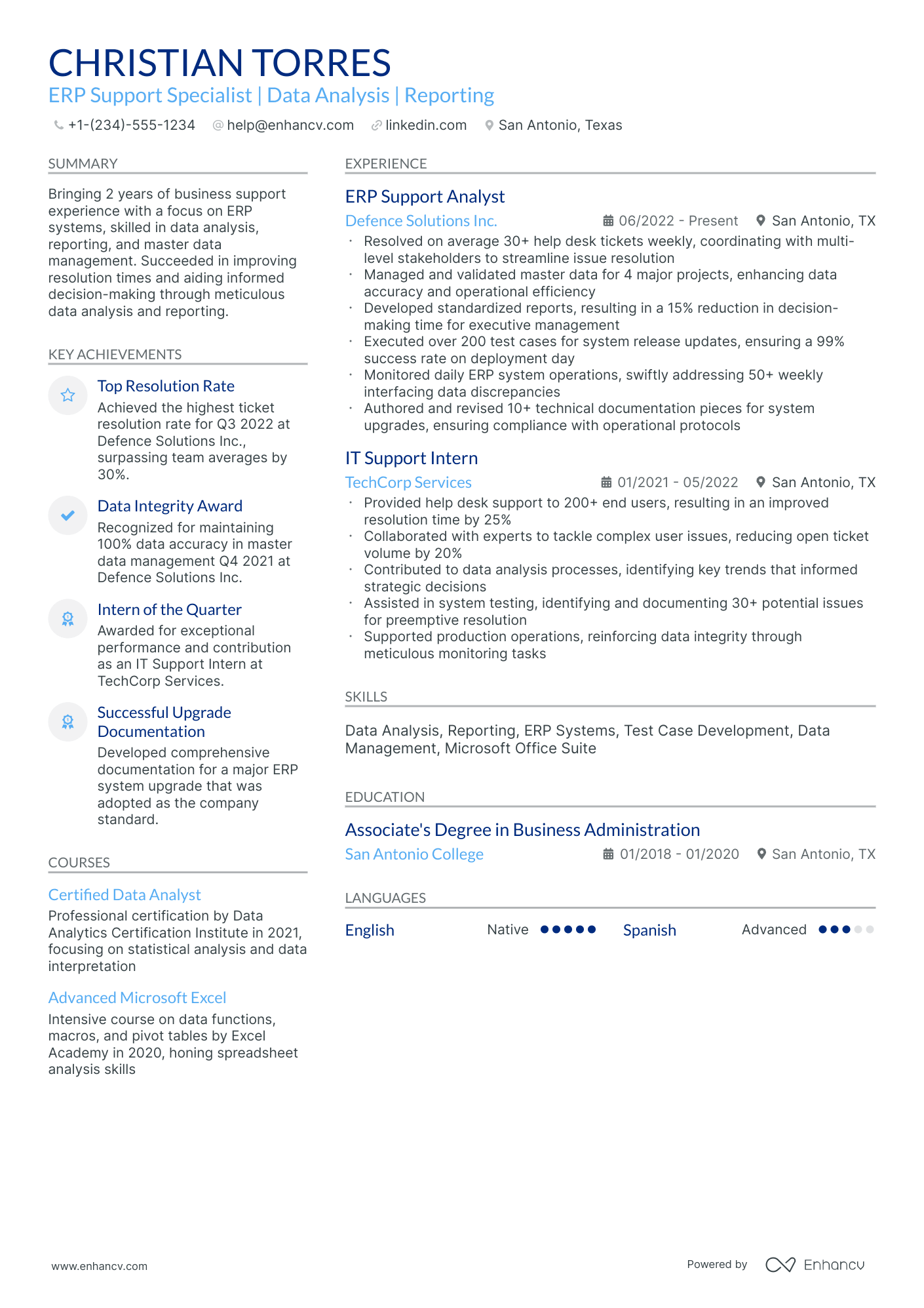Junior business analysts often struggle with showcasing relevant experience on their resumes due to a limited professional history in the field. Our guide provides actionable strategies for highlighting transferable skills and project involvement to effectively demonstrate their potential value to employers.
- Aligning the top one-third of your junior business analyst resume with the role you're applying for.
- Curating your specific junior business analyst experience to get the attention of recruiters.
- How to list your relevant education to impress hiring managers recruiting for the junior business analyst role.
- Discover more junior business analyst professional examples to help you write a job-winning resume.
- Floor Manager Resume Example
- Relationship Manager Resume Example
- Technical Manager Resume Example
- Business Unit Manager Resume Example
- Construction General Manager Resume Example
- Director of Business Development Resume Example
- Banking Business Analyst Resume Example
- Financial Business Analyst Resume Example
- Solution Manager Resume Example
- Venue Manager Resume Example
simple guide to your junior business analyst resume format and layout
Successful junior business analyst resumes all have one specific characteristic - candidates have invested in a simple resume layout . One that is easy to read, makes a good first impression, and is adapted to their professional experience. There are three distinct resume formats to help you focus on your:
- professional experience - use the reverse-chronological resume format;
- skills and achievements - via the functional skill-based resume format;
- both experience and skills - with a hybrid resume format .
What is more, keep in mind that your resume may be initially assessed by the ATS (Applicant Tracker System) (or the software used by companies in the hiring process). The junior business analyst resumes that suit the ATS:
- have a header that includes either a role keyword or the job you're applying for;
- should be no longer than two pages;
- be submitted as PDF, unless specified otherwise.
Keep in mind market-specific formats – for example, a Canadian resume might follow a different structure.
Upload & Check Your Resume
Drop your resume here or choose a file. PDF & DOCX only. Max 2MB file size.
PRO TIP
Use bold for section headings to facilitate easy navigation and enhance readability.
Ensure your junior business analyst resume stands out with these mandatory sections:
- Header - the section recruiters look to find your contact details, portfolio, and potentially, your current role
- Summary or objective - where your achievements could meet your career goals
- Experience - showcasing you have the technical (and personal) know-how for the role
- Skills - further highlighting capabilities that matter most to the junior business analyst advert and your application
- Certifications/ Education - staying up-to-date with industry trends
What recruiters want to see on your resume:
What recruiters want to see on your resume:
- Proficiency in analytics tools (e.g., Excel, SQL, Tableau) relevant to business analysis.
- Understanding of business intelligence principles and data analysis techniques.
- Experience with requirements gathering and the ability to translate business needs into technical specifications.
- Demonstrated problem-solving skills and the capacity to work with cross-functional teams.
- Relevant certifications or coursework in business analysis, data analysis, or a related field.
Experience section for candidates with zero-to-none experience
While you may have less professional experience in the field, that doesn't mean you should leave this section of your resume empty or blank.
Consider these four strategies on how to substitute the lack of experience with:
- Volunteer roles - as part of the community, you've probably gained valuable people (and sometimes even technological capabilities) that could answer the job requirements
- Research projects - while in your university days, you may have been part of some cutting-edge project to benefit the field. Curate this within your experience section as a substitute for real-world experience
- Internships - while you may consider that that summer internship in New York was solely mandatory to your degree, make sure to include it as part of your experience, if it's relevant to the role
- Irrelevant previous jobs - instead of detailing the technologies you've learned, think about the transferable skills you've gained.
Quantifying impact on your resume
- Include the specific metrics and KPIs you have experience with, showing that you can measure and track performance effectively.
- Quantify the size of the datasets you've worked with to demonstrate your ability to handle significant amounts of data.
- Mention the percentage of efficiency improvements in processes you've contributed to, indicating your capacity for enhancing business operations.
- Highlight the monetary value of the cost savings or revenue increases your analyses have led to, illustrating your direct impact on the company's bottom line.
- Specify the number of projects or initiatives you've worked on to give a sense of your experience and breadth of work.
- Document the precise tools and software you're proficient in (e.g., SQL, Python, Tableau), showing your technical capabilities for data analysis.
- Note the number of stakeholders or teams you’ve supported, which signals your ability to communicate insights across the organization.
- Detail the percentage growth in key business areas you've influenced through your analytical insights, establishing your role in strategic decision-making.
Action verbs for your junior business analyst resume
PRO TIP
When creating your resume, select a template that is functional and features plenty of space for you to reflect upon your unique junior business analyst expertise.
How to showcase hard skills and soft skills on your resume
Reading between the lines of your dream job, you find recruiters are looking for candidates who have specific software or hardware knowledge, and personal skills.
Any technology you're adept at shows your hard skills. This particular skill set answers initial job requirements, hinting at how much time your potential employers would have to invest in training you. Showcase you have the relevant technical background in your communicate, solve problems, and adapt to new environments. Basically, your interpersonal communication skills that show recruiters if you'd fit into the team and company culture. You could use the achievements section to tie in your greatest wins with relevant soft skills.
It's also a good idea to add some of your hard and soft skills across different resume sections (e.g. summary/objective, experience, etc.) to match the job requirements and pass the Applicant Tracker Software (ATS) assessments. Remember to always check your skill spelling and ensure that you've copy-pasted the name of the desired skills from the job advert as is.
Top skills for your junior business analyst resume:
Microsoft Excel
SQL
Tableau
Power BI
JIRA
Visio
Data Analysis
Business Process Modeling
Requirements Gathering
Basic Python
Analytical Thinking
Communication
Problem Solving
Attention to Detail
Teamwork
Time Management
Adaptability
Critical Thinking
Stakeholder Management
Curiosity
The top 5 certifications for your junior business analyst resume:
- Entry Certificate in Business Analysis (ECBA) - International Institute of Business Analysis (IIBA)
- Certification of Competency in Business Analysis (CCBA) - International Institute of Business Analysis (IIBA)
- PMI Professional in Business Analysis (PMI-PBA) - Project Management Institute (PMI)
- Business Analyst Certification (BAC) - International Qualifications Network (IQN)
- Certified Business Analysis Professional (CBAP) - International Institute of Business Analysis (IIBA)
PRO TIP
When creating your resume, select a template that is functional and features plenty of space for you to reflect upon your unique junior business analyst expertise.
Adding your relevant certifications and education on your junior business analyst resume
In recent times, employers have started to favor more and more candidates who have the "right" skill alignment, instead of the "right" education.
But this doesn't mean that recruiters don't care about your certifications .
Dedicate some space on your resume to list degrees and certificates by:
- Including start and end dates to show your time dedication to the industry
- Adding credibility with the institutions' names
- Prioritizing your latest certificates towards the top, hinting at the fact that you're always staying on top of innovations
- If you decide on providing further information, focus on the actual outcomes of your education: the skills you've obtained
- If you happen to have a degree or certificate that is irrelevant to the job, you may leave it out.
Some of the most popular certificates for your resume include:
PRO TIP
Use bold for section headings to facilitate easy navigation and enhance readability.
Recommended reads:
PRO TIP
Use bold for section headings to facilitate easy navigation and enhance readability.
Recommended reads:
the ideal junior business analyst candidate resume summary or objective
You may have heard that your resume top one-third plays an important part in your application.
It basically needs to show strong alignment with the job advert, your unique skill set, and your expertise.
Both the resume summary and resume objective could be used to ensure you've shown why you're the best candidate for the role.
Use the:
- Resume objective to pinpoint your current successes, that are applicable to the field, and your vision for your career. Remember to state how you see yourself growing within this new career opportunity.
- Resume summary as an instrument to pinpoint what is most applicable and noteworthy form your professional profile. Keep your summary to be no more than five sentences long.
At the end of the day, the resume summary or objective is your golden opportunity to shine a light on your personality as a professional and the unique value of what it's like to work with you.
Get inspired with these junior business analyst resume examples:
Resume summaries for a junior business analyst job
- Eager to leverage my strong quantitative skills and proficiency in data analytics tools like SQL and Excel to uncover actionable insights for Acme Corp's dynamic marketing team, while furthering my understanding of market trends and consumer behavior.
- As a meticulous data enthusiast, aiming to contribute my expertise in predictive modeling and business intelligence software to enhance strategic decision-making processes at Phoenix Technologies.
- Seeking to support the financial analysis efforts at Oceanic Bank through my adept knowledge of Python and R, while continuously seeking to refine methodologies in line with cutting-edge economic theories and practices.
- Dedicated to employing my strong attention to detail and advanced knowledge in BI tools like Tableau to drive growth and efficiency within GreenTech Solar's operations and sales divisions, focusing on sustainability and market expansion.
- Aiming to bring my passion for data-driven problem-solving to Quantum Consultants by employing advanced statistical techniques, and collaborating with cross-functional teams to optimize client solutions and internal processes.
- Desiring to apply my robust analytical skills and my proficiency with CRM systems to maximize customer satisfaction and retention strategies for Jetset Travel Agency, always keeping an eye on emerging industry trends and customer preferences.
Optimize your resume summary and objective for ATS
Drop your resume here or choose a file.
PDF & DOCX only. Max 2MB file size.
showcasing your personality with these four junior business analyst resume sections
Enhance your junior business analyst expertise with additional resume sections that spotlight both your professional skills and personal traits. Choose options that not only present you in a professional light but also reveal why colleagues enjoy working with you:
- My time - a pie chart infographic detailing your daily personal and professional priorities, showcasing a blend of hard and soft skills;
- Hobbies and interests - share your engagement in sports, fandoms, or other interests, whether in your local community or during personal time;
- Quotes - what motivates and inspires you as a professional;
- Books - indicating your reading and comprehension skills, a definite plus for employers, particularly when your reading interests align with your professional field.
Key takeaways
- The format and layout of your junior business analyst resume should reflect on both your career and what matters most to the job you're applying for;
- Use the resume summary and objective to hint at your most prominent accomplishments;
- Always be specific about your experience and consider what value each bullet you curate adds to your junior business analyst application;
- Consider how your academic background and technical capabilities could further showcase your alignment to the role;
- Your soft skills should contribute to your overall junior business analyst profile - aligning your personality with skills and results.
